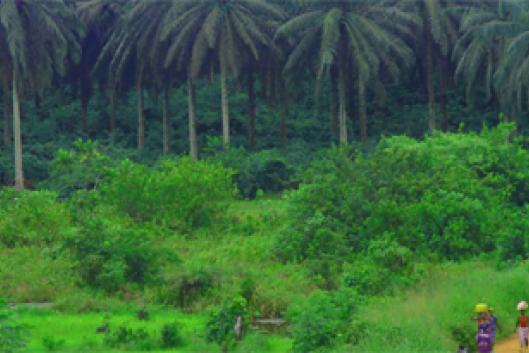One month after the confrontation between land owners in the SahnMalen Chiefdom, Pujehun District in southern Sierra Leone and the SOCFIN Agricultural Company (see WRM Bulletin 197, at http://wrm.org.uy/articles-from-the-wrm-bulletin/section1/
sierra-leone-farmers-reject-land-grab-for-oil-palm-plantation/), Green Scenery published a 13-page report on the clamp down on community members who have been advocating for their rights to their land.
The report was the result of a fact finding trip to the region to corroborate facts of the police arrest and highhanded measure of fifty seven citizens.
Green Scenery’s report highlights that “the SOCFIN Company leased from the Government a total of 6,500 ha. While the communities/land owners and users challenge the manner in which it was done, SOCFIN has been able to assert its hold on this land area and has planted if not all with palm trees. Socfin’s operation affects an estimated population of 9,000 people and 22 villages within this area.
But SOCFIN’s insatiable desire for more land continues to drive the company in taking over more land even over the agreed lease agreement. It is confirmed by company authorities that the company is now in control of 7,100 ha of land an area in excess of 600 ha in breach of its agreement with the government. There are now over forty communities affected by its operations and a total population in excess of 10,000 people and in spite of all of the conflict the land takeover is causing, SOCFIN continues to endure working with the Paramount Chief and his Speaker to forcefully take land from land owners and pass it on to the willing company.”
Green Scenery considers that “perhaps one of the problems in the land sector has to do with governance”. Thus, it explains that though “cap. 122 [of the Constitution] may be seen as a law with a good interpretational spirit for not allowing land in the provinces to be sold to none citizens and vesting the land in the Tribal Authorities (chiefdom council) which head is the paramount chief, it has a lacuna which is being exploited and misused. This misuse is giving rise to the present instability in regions affected by land grabbing such as Malen. One key lacuna is the entrusting of land in the Chiefdom Council on behalf of the communities. Ostensibly, the law entrusting the land to the care of chiefdom authorities authenticates the customary law practice of land disposal/acquisition in many parts of the country.
The challenge however with the law is that it is been abused by certain chiefdom authorities, government authorities and agents due to its looseness and ill-explicit definition of the role of trusteeship.
It is very important that in this period of constitutional review the issue of land ownership and tenure-ship as well as problematic phrases or words that are causing confusion and tension around land would be addressed.
As we examine the stakes we continue to observe the trend in the intensity of the conflict in Malen. As we continue to monitor land grabbing in Sierra Leone we note this observation for Malen that the conflict has graduated from one of mild disagreement to serious dispute and each time no proactive action is taken to genuinely deal with the Malen problem and keeping it the problem under the mat hoping it will solve itself lays the risk of moving into the next stage. The situation at this stage requires frank dialogue by all Malen citizens, whether or not they are land owners. It requires taking decisions humane enough to respect rights of citizens, and ensuring that people decide their own destiny.”
Source: “Report on the incident of police arrest andhighhanded measure of fifty seven citizens inMalen Chiefdom, Pujehun district,” by Joseph Rahall, Milton Kainyande, Green Scenery, December 2013, released January 2014. c<f.williams@greenscenery.org>, http://wrm.org.uy/wp-content/uploads/2014/02/Arrest_of_fifty_seven_
citizens_in_Malen_Chiefdom.pdf
